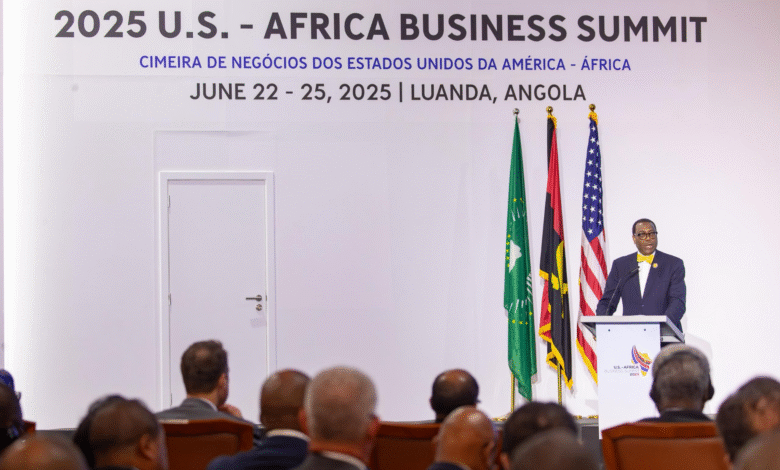US-Africa Summit : towards a new era of investment
The 17th US-Africa Business Summit in Luanda placed investment and trade at the heart of relations between the two continents, marking an end to the era of traditional aid. A strong call was made to seize strategic opportunities, notably around the Lobito Corridor.

From June 22 to 25, 2025, Luanda, the Angolan capital, hosted the 17th US-Africa Business Summit, bringing together more than 1,500 participants, including several African heads of state, senior government officials, and representatives from both the American and African business communities. This edition, set against a tense international backdrop and a strategic repositioning of relations between the two continents, focused discussions on minerals, oil, infrastructure, and trade agreements.
Relations between Washington and the African continent are evolving, shifting from development aid diplomacy towards a model based on trade and investment
As relations between Washington and Africa evolve from aid-based diplomacy to a trade and investment-driven model, the summit took place amid a complex geopolitical climate. Under the Trump administration, several measures weakened exchanges, including suspension of aid programs, punitive tariffs up to 50% on countries like Lesotho, and visa restrictions affecting several African nations. In this reality, China’s recent announcement to exempt almost all African exports from tariffs into its territory increases pressure on the US to reinvent its African policy.
In this context, the Luanda summit, organized by the Corporate Council on Africa (CCA) in partnership with the Angolan government, established itself as a strategic platform to promote a renewed economic cooperation model. Among the many attendees were seven African heads of state—including Brice Oligui Nguema of Gabon, Denis Sassou Nguesso of Congo, Félix Tshisekedi of the DRC—and several prime ministers, as well as senior officials from the African Development Bank (AfDB) and the African Continental Free Trade Area (AfCFTA).

The Lobito Railway Corridor, “an ambitious project”
A key highlight of the summit was the Lobito railway corridor, a strategic infrastructure linking the Democratic Republic of Congo to Angola, vital for transporting minerals. Osvaldo Mboco, international relations expert at Angola’s Technical University, emphasizes that this corridor is much more than a railway line: “We can expect new investors to view the Lobito Corridor as an ambitious project, going beyond simple investment in the railway itself. It also involves investments in logistics platforms, processing industries, etc.” This project is backed by the African Development Bank, which is mobilizing $500 million through its African Development Fund, plus an additional $1 billion over five years for complementary investments in agricultural value chains, roads, and energy infrastructure.
Savvy investors should pay attention to Africa

The importance of this new investment paradigm was underlined by AfDB President Akinwumi Adesina during his summit speech. He urged investors, especially Americans, to take a greater interest in Africa, stressing that “savvy investors should pay attention to Africa,” highlighting the continent’s abundant natural resources, untapped arable land, and some of the world’s fastest-growing countries. According to him, return on investment in Africa could reach between 15 and 20%, while risk premiums remain low according to recent Moody’s data. He encouraged companies to “act on data, not perceptions” and seize the many opportunities the continent offers.
It is time to replace the logic of aid with the logic of investment and trade
Angolan President João Manuel Gonçalves Lourenço, host of the summit, reinforced this message by inviting American businesses to invest in a continent rich in potential, not only in traditional sectors like oil and minerals but also in areas such as automotive, shipbuilding, tourism, and cement and steel production. At the opening ceremony, he declared forcefully: “It is time to replace the logic of aid with the logic of investment and trade.”
`
A call to action
In the same vein, Mahmoud Ali Youssouf, Chairperson of the African Union Commission, insisted on the need to remove trade barriers such as punitive tariffs and visa restrictions, underlining that Africa—with its population of 1.3 billion and abundant resources—represents a major yet underexploited economic opportunity. He called for “a call to action,” based on unity, determination, and Agenda 2063, to build a truly transformative partnership.
This will to move from rhetoric to concrete action was translated into commitments around infrastructure development, strengthening agriculture, mineral industrialization, as well as modernization of digital infrastructure and financial markets. AfCFTA Secretary General Wamkele Mene reaffirmed the crucial importance of regional integration to accelerate industrial development and facilitate investments, stressing the necessary ambition of the project.
The US commercial strategy in Africa needed to adapt to current realities

On the US side, Troy Fitrell, senior official at the State Department, emphasized that the US commercial strategy in Africa had to adapt to realities vastly different from those 25 years ago. He stressed the now active role of US embassies with the African private sector, stating that “our mission is to find opportunities and encourage businesses to engage.” According to him, it is essential that American companies realize the real opportunities in the African market, which combines skilled local labor with investments in the latest technologies and innovations.
The summit thus marked a turning point: Africa no longer seeks aid but demands sustainable and strategic economic partnerships capable of unlocking its potential estimated at one trillion dollars. The Corporate Council on Africa, represented by its president Florie Liser, encouraged participants to move beyond mere agreements to build lasting transformations.
Renegotiation of AGOA
However, while ambitions are high, success will depend on the ability to realize these announcements, notably by finalizing the renegotiation of AGOA, the Africa-US trade agreement expiring in September 2025, effectively deploying announced financing, and ensuring transparency and monitoring of committed projects. The path toward shared prosperity now depends on the political will of states and economic actors to turn words into action.






